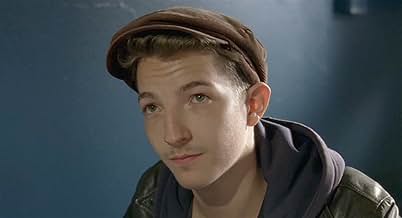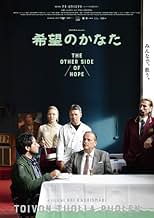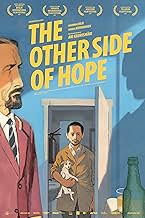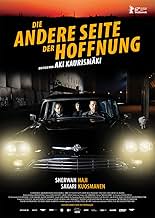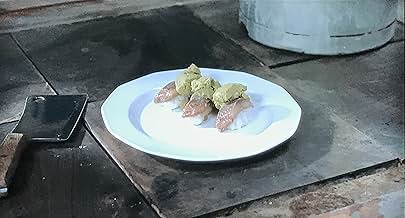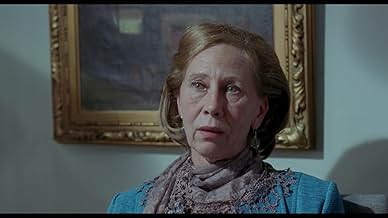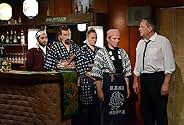PUNTUACIÓN EN IMDb
7,2/10
14 mil
TU PUNTUACIÓN
El propietario de un restaurante, jugador de póquer y antiguo agente comercial, hace amistad con un grupo de refugiados recién llegados a Finlandia.El propietario de un restaurante, jugador de póquer y antiguo agente comercial, hace amistad con un grupo de refugiados recién llegados a Finlandia.El propietario de un restaurante, jugador de póquer y antiguo agente comercial, hace amistad con un grupo de refugiados recién llegados a Finlandia.
- Dirección
- Guión
- Reparto principal
- Premios
- 8 premios y 24 nominaciones en total
Abdi Jama
- Aseman kassa
- (as Abdi alias 'Lii' Jama)
Simon Al-Bazoon
- Mazdak
- (as Simon Hussein Al-Bazoon)
Reseñas destacadas
The Other Side of Hope tackles a timely matter, the refugee crisis in Europe in the wake of the ISIL wars, with a wry and deadpan sense of humour, resulting in a product with a lot of personality and colour. It's a Finnish film that received international attention but doesn't present the Finns themselves in a totally positive light- but then, we know the Finns haven't been the only ones to show a complete lack of humanity and empathy towards those who've suffered so much.
The film boasts a number of memorable characters, particularly Waldemar Wikström, who purchases a restaurant called The Golden Pint while looking for a new line of work after a separation. A profitable business, he is told, because people drink when times are bad, and more when times are good. He finds himself leading a staff of three Finns, then a dog, and finally Khaled, a Syrian refugee only looking for his sister. Wikström brings Khaled in after the courts decide, rather dubiously, that there is no war in Aleppo.
The Other Side of Hope isn't naive in imagining a harmonious outcome for everyone. It brings us a vision of hardships that nevertheless, with its humour and hope, inspires, and brings a smile to the face.
The film boasts a number of memorable characters, particularly Waldemar Wikström, who purchases a restaurant called The Golden Pint while looking for a new line of work after a separation. A profitable business, he is told, because people drink when times are bad, and more when times are good. He finds himself leading a staff of three Finns, then a dog, and finally Khaled, a Syrian refugee only looking for his sister. Wikström brings Khaled in after the courts decide, rather dubiously, that there is no war in Aleppo.
The Other Side of Hope isn't naive in imagining a harmonious outcome for everyone. It brings us a vision of hardships that nevertheless, with its humour and hope, inspires, and brings a smile to the face.
After 'Le Havre', this is Kaurismäki's second film about refugees. This is a hot topic, now even more than ever. Europe is still trying to digest the influx of refugees from Syria and Iraq, a process with major political consequences.
There is no doubt about Kaurismäki's moral position. The lead characters in 'The other side of hope' don't even discuss if they should help the Syrian refugee Khaled, they just do it as if there is no other choice. In perhaps Kaurismäki's most political scene ever, a police officer tells Khaled that Aleppo, the city where he came from, is not unsafe according to the Finnish immigration authority, so he should be deported back to Syria. Immediately after the verdict, Kaurismäki shows a news report on Finnish television about the atrocities going on in Aleppo.
The complete lack of emotions, a trademark feature of Kaurismäki's work, adds an extra dimension to the message. The refugee doesn't complain, his protectors don't discuss, the violent racists don't explain. Everything just happens.
Of course, this being a Kaurismäki film, there are the typical elements of his movies: the fifties aesthetics, the deadpan humor, the stripped-to-the-bone dialogue. Music is also an important element in this film. It is, without exception, source music from musicians playing in bars, café's or in the street. It is all sung in Finnish, but has a very bluesy feeling, perfectly matching the overall mood of the film.
The screenplay has a special structure: for the most part of the film, the viewer is watching two separate stories. One is about the refugee Khaled entering the country as a stowaway in a cargo ship, trying to find his way in society and being processed by the immigration authority. The other is about a business man trying to revive an unprofitable restaurant. Of course, the two are destined to run into each other.
Kaurismäki is one of those film makers whose style is unique and doesn't resemble anything else. For that reason alone, his work is worth watching. In this film, he adds a political message which is as urgent as can be.
There is no doubt about Kaurismäki's moral position. The lead characters in 'The other side of hope' don't even discuss if they should help the Syrian refugee Khaled, they just do it as if there is no other choice. In perhaps Kaurismäki's most political scene ever, a police officer tells Khaled that Aleppo, the city where he came from, is not unsafe according to the Finnish immigration authority, so he should be deported back to Syria. Immediately after the verdict, Kaurismäki shows a news report on Finnish television about the atrocities going on in Aleppo.
The complete lack of emotions, a trademark feature of Kaurismäki's work, adds an extra dimension to the message. The refugee doesn't complain, his protectors don't discuss, the violent racists don't explain. Everything just happens.
Of course, this being a Kaurismäki film, there are the typical elements of his movies: the fifties aesthetics, the deadpan humor, the stripped-to-the-bone dialogue. Music is also an important element in this film. It is, without exception, source music from musicians playing in bars, café's or in the street. It is all sung in Finnish, but has a very bluesy feeling, perfectly matching the overall mood of the film.
The screenplay has a special structure: for the most part of the film, the viewer is watching two separate stories. One is about the refugee Khaled entering the country as a stowaway in a cargo ship, trying to find his way in society and being processed by the immigration authority. The other is about a business man trying to revive an unprofitable restaurant. Of course, the two are destined to run into each other.
Kaurismäki is one of those film makers whose style is unique and doesn't resemble anything else. For that reason alone, his work is worth watching. In this film, he adds a political message which is as urgent as can be.
Aki Kaurismäki's film 'The Other Side of Hope' is really two films in one: the first, a deadly serious look at the life of a Syrain refugee in Finland, and the other, a deadpan comic look at the escapades of an unlikely restauranteur. Oddly, it works, with its direct abutment of light and shade, and its playful treatment of the legendary Finish characteristic of taciturnity. A nice element of the movie is it's use of music as a symbol of our common humanity. It's a simple film, but I liked it.
Saw this at the Berlinale 2017, where it was part of the official competition for the Golden Bear. The synopsis on the festival website was not really promising, but my prejudice disappeared gradually during the screening. Although the movie has a certain inclination to become a fairy tale where everyone will live happily ever after, the ending has some darker sides to downplay the assumed optimistic story. One of these darker sides lies in the several times appearing "Finland security" men, who are up to no good.
Our first main protagonist Khaled is seeking asylum in Finland. From the outside, it looks like a very clean process as far as shown to us. The idle waiting time related to the asylum application procedure does hide the rough edges we often read about, namely that asylum seekers among themselves are making trouble when seeing others with a different religion or other political position, or even worse when seeing GLBT behavior that they are not prepared to allow. Intolerance can be very problematic here, given that the people are packed together, while at the same time being bored to death, doomed to wait, unable to do anything useful. Due to their numbers and possible variations in asylum seekers, it is a sheer impossible task to sort and separate them in such a way that such troubles are prevented. In this movie, however, the asylum seekers are living harmoniously together, and help each other where they can without seeking favors in return. What does Finland do what we apparently are doing wrong in The Netherlands??
Our second main protagonist Wikström follows a completely different path. On a random morning, he leaves his wedding ring and house keys with his wife, who is clearly alcohol addicted. He sells his stock but keeps the storage space (will become unexpectedly useful later). What also proves useful is his poker face, and he succeeds in multiplying his amount of cash considerably, to the extent that he can buy a restaurant including staff. The capabilities of the restaurant staff that he takes over with the rest of the inventory and furniture, do not look very promising from the outset, but he keeps them nevertheless.
For the first 30 minutes or so, the stories of above two main protagonists run their completely separate course. We see them in turns, both paths clearly delineated, simply by having other people and another decor visible. After his asylum request being denied, and just before being transported to a plane to be sent back, Khaled escapes and starts an uncertain life on the street. He is found sleeping between the trashcans by fresh restaurateur Wikström, from which moment on their lives become mingled.
The restaurant business does not go as well as may be hoped. Given the quality of the staff that he inherited when buying the restaurant, it can be no surprise from the first day on. For example, when someone orders sardines from the menu, that seems to mean that he receives a half opened can. More humor follows later on when they try out different restaurant types, e.g. sushi being prepared out of a cooking book. Other experiments also hardly succeed. A surprise inspection is handled in a way not exactly by-the-book but they pass. These humoristic scenes are intermixed with the more serious main line of the story.
The story includes a series of lucky strikes and happy coincidences that is overwhelming, bordering on statistically impossible. But otherwise there would have been no story to tell, so who am I to complain. The musical fragments we witnessed, most in cafés or restaurants, even one where Khaled plays the sitar (is that the proper name?), albeit not relevant to the story itself, are included (I think) as ornamentation or as local folklore, or simply happened to be available and deemed a waste when left out.
All in all, this movie is much better than what the average synopsis promises. On the other hand, it is not easy to describe what it is exactly that makes the movie attractive. The serious undertone cannot be overlooked, given the hostilities encountered by Khaled, and the motivation for the denial of his asylum request is also a farce, based on wrong facts that we see refuted on TV, and gives Finland a bad name. However, the parallel story with Wikström and his restaurant takes good care of ample relief from the heavy material. I usually lower my expectations when a book or movie builds on two or more parallel story lines, by assuming that none of the stories could offer sufficient material to stand on its own feet, but this time my prejudice proved unjustified. The way both stories were mixed without disturbing the logical flow of events, may be one of the reasons this movie was awarded by the International Jury of the Berlinale 2017.
Our first main protagonist Khaled is seeking asylum in Finland. From the outside, it looks like a very clean process as far as shown to us. The idle waiting time related to the asylum application procedure does hide the rough edges we often read about, namely that asylum seekers among themselves are making trouble when seeing others with a different religion or other political position, or even worse when seeing GLBT behavior that they are not prepared to allow. Intolerance can be very problematic here, given that the people are packed together, while at the same time being bored to death, doomed to wait, unable to do anything useful. Due to their numbers and possible variations in asylum seekers, it is a sheer impossible task to sort and separate them in such a way that such troubles are prevented. In this movie, however, the asylum seekers are living harmoniously together, and help each other where they can without seeking favors in return. What does Finland do what we apparently are doing wrong in The Netherlands??
Our second main protagonist Wikström follows a completely different path. On a random morning, he leaves his wedding ring and house keys with his wife, who is clearly alcohol addicted. He sells his stock but keeps the storage space (will become unexpectedly useful later). What also proves useful is his poker face, and he succeeds in multiplying his amount of cash considerably, to the extent that he can buy a restaurant including staff. The capabilities of the restaurant staff that he takes over with the rest of the inventory and furniture, do not look very promising from the outset, but he keeps them nevertheless.
For the first 30 minutes or so, the stories of above two main protagonists run their completely separate course. We see them in turns, both paths clearly delineated, simply by having other people and another decor visible. After his asylum request being denied, and just before being transported to a plane to be sent back, Khaled escapes and starts an uncertain life on the street. He is found sleeping between the trashcans by fresh restaurateur Wikström, from which moment on their lives become mingled.
The restaurant business does not go as well as may be hoped. Given the quality of the staff that he inherited when buying the restaurant, it can be no surprise from the first day on. For example, when someone orders sardines from the menu, that seems to mean that he receives a half opened can. More humor follows later on when they try out different restaurant types, e.g. sushi being prepared out of a cooking book. Other experiments also hardly succeed. A surprise inspection is handled in a way not exactly by-the-book but they pass. These humoristic scenes are intermixed with the more serious main line of the story.
The story includes a series of lucky strikes and happy coincidences that is overwhelming, bordering on statistically impossible. But otherwise there would have been no story to tell, so who am I to complain. The musical fragments we witnessed, most in cafés or restaurants, even one where Khaled plays the sitar (is that the proper name?), albeit not relevant to the story itself, are included (I think) as ornamentation or as local folklore, or simply happened to be available and deemed a waste when left out.
All in all, this movie is much better than what the average synopsis promises. On the other hand, it is not easy to describe what it is exactly that makes the movie attractive. The serious undertone cannot be overlooked, given the hostilities encountered by Khaled, and the motivation for the denial of his asylum request is also a farce, based on wrong facts that we see refuted on TV, and gives Finland a bad name. However, the parallel story with Wikström and his restaurant takes good care of ample relief from the heavy material. I usually lower my expectations when a book or movie builds on two or more parallel story lines, by assuming that none of the stories could offer sufficient material to stand on its own feet, but this time my prejudice proved unjustified. The way both stories were mixed without disturbing the logical flow of events, may be one of the reasons this movie was awarded by the International Jury of the Berlinale 2017.
Most of us have never had a 'refugee experience'. Many have read about it and some take a close interest, but usually it is something that happens to others in distant places. The confusingly labelled comedy-drama The Other Side of Hope (2017)is remarkably effective in bringing the refugee experience right into our face. Once seen, it is hard to regard it as only happening to nameless people in faraway lands.
The narrative frame has a haphazard quality about it, as if the audience has stumbled upon a vantage point from which we can see two hopeless lives randomly collide. After finally walking out on his alcoholic wife, dour Finnish salesman Waldemar (Sakari Kuosmanen) throws the sale proceeds from his business into a high-stakes poker game and makes a small fortune. After buying a run-down restaurant, he encounters Khaled (Sherwan Haji) sheltering among his rubbish bins. The Iraqi refugee had arrived in Helsinki via a coal-cargo ship while fleeing for his life. Refused refugee status and held for deportation by heartless Finnish authorities, Khaled is stateless, friendless, and homeless. Waldemar offers him work and shelter and tries to help him locate his sister who became lost while trying to escape the Syrian Civil War.
The story contains little humour. Its 'comedy-drama' label comes from totally deadpan performances that verge on absurdism, aided by a dark, almost noir filming palette. Most of the sub-titled dialogue is delivered without expression, which emphasises the heartless world into which the refugee is pushed. Dramatic situations that cry out for emotional expression are left cold, and it is this denial of the natural that most hits the viewer. For example, when the Finnish immigration official interviews Khaled for his refugee status, the honesty and sadness of his story are overwhelming yet not a trace of emotion is evident in either interviewer or interviewee. When Khaled is asked what he wants, the depth of his despair is in his words, not their expression: "I do not matter".
An element of the unexpected can add to the enjoyment of a movie, but perhaps not in this case. If you expect an entertaining comedy-drama from a nation well-known for its dark quirky humour you may be disorientated and possibly disappointed. The intention of this film is not to entertain, but to confront, inform, and engage. As global refugee problems continue unabated, The Other Side of Hope does not offer comfort or clarity, and this is reflected in its open-ended conclusion. The film's major achievement is how it makes us look directly into the face of the hopeless and hear the voice of the dispossessed. It leaves a heavy footprint.
The narrative frame has a haphazard quality about it, as if the audience has stumbled upon a vantage point from which we can see two hopeless lives randomly collide. After finally walking out on his alcoholic wife, dour Finnish salesman Waldemar (Sakari Kuosmanen) throws the sale proceeds from his business into a high-stakes poker game and makes a small fortune. After buying a run-down restaurant, he encounters Khaled (Sherwan Haji) sheltering among his rubbish bins. The Iraqi refugee had arrived in Helsinki via a coal-cargo ship while fleeing for his life. Refused refugee status and held for deportation by heartless Finnish authorities, Khaled is stateless, friendless, and homeless. Waldemar offers him work and shelter and tries to help him locate his sister who became lost while trying to escape the Syrian Civil War.
The story contains little humour. Its 'comedy-drama' label comes from totally deadpan performances that verge on absurdism, aided by a dark, almost noir filming palette. Most of the sub-titled dialogue is delivered without expression, which emphasises the heartless world into which the refugee is pushed. Dramatic situations that cry out for emotional expression are left cold, and it is this denial of the natural that most hits the viewer. For example, when the Finnish immigration official interviews Khaled for his refugee status, the honesty and sadness of his story are overwhelming yet not a trace of emotion is evident in either interviewer or interviewee. When Khaled is asked what he wants, the depth of his despair is in his words, not their expression: "I do not matter".
An element of the unexpected can add to the enjoyment of a movie, but perhaps not in this case. If you expect an entertaining comedy-drama from a nation well-known for its dark quirky humour you may be disorientated and possibly disappointed. The intention of this film is not to entertain, but to confront, inform, and engage. As global refugee problems continue unabated, The Other Side of Hope does not offer comfort or clarity, and this is reflected in its open-ended conclusion. The film's major achievement is how it makes us look directly into the face of the hopeless and hear the voice of the dispossessed. It leaves a heavy footprint.
¿Sabías que...?
- CuriosidadesThe actors playing siblings Khaled and Miriam are real-life siblings.
- ConexionesFeatured in Ismo Haavisto One Man Band: Midnight Man (2017)
- Banda sonoraOi mutsi, mutsi
Written and performed by Tuomari Nurmio
Selecciones populares
Inicia sesión para calificar y añadir a tu lista para recibir recomendaciones personalizadas
- How long is The Other Side of Hope?Con tecnología de Alexa
Detalles
- Fecha de lanzamiento
- Países de origen
- Sitios oficiales
- Idiomas
- Títulos en diferentes países
- The Other Side of Hope
- Localizaciones del rodaje
- Helsinki, Finlandia(The city)
- Empresas productoras
- Ver más compañías en los créditos en IMDbPro
Taquilla
- Presupuesto
- 1.600.000 € (estimación)
- Recaudación en Estados Unidos y Canadá
- 183.943 US$
- Fin de semana de estreno en EE. UU. y Canadá
- 15.495 US$
- 3 dic 2017
- Recaudación en todo el mundo
- 4.282.973 US$
- Duración1 hora 40 minutos
- Color
- Mezcla de sonido
- Relación de aspecto
- 1.85 : 1
Contribuir a esta página
Sugerir un cambio o añadir el contenido que falta

Principal laguna de datos
By what name was El otro lado de la esperanza (2017) officially released in India in English?
Responde

